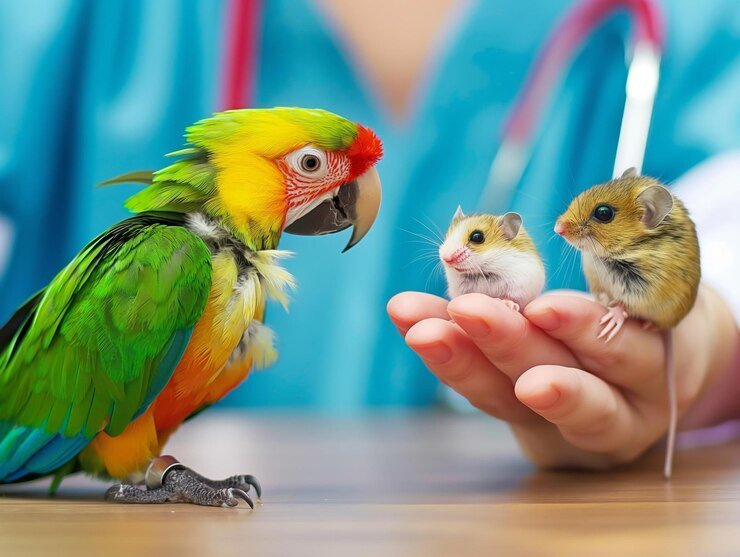When it comes to pet ownership, many people think of traditional animals like dogs and cats. However, the world of exotic pets offers a diverse array of unique companions that can bring joy and fascination into your life. This guide will delve into the characteristics, care requirements, and considerations involved in owning exotic pets, helping you make an informed decision if you’re considering expanding your family with one of these remarkable animals.
What Are Exotic Pets?
Exotic pets encompass a wide variety of species that are not commonly kept as household companions. This category includes reptiles, birds, small mammals, and some fish. Some popular exotic pets include:
- Reptiles: Bearded dragons, snakes (like ball pythons), geckos, and turtles.
- Birds: Parrots (such as African greys and macaws), cockatiels, and finches.
- Small Mammals: Hedgehogs, sugar gliders, ferrets, and chinchillas.
- Fish: Unique species like bettas, discus, and saltwater fish.
Each of these animals brings distinct behaviors, care needs, and characteristics that set them apart from more traditional pets.
Benefits of Owning Exotic Pets
1. Unique Companionship
Exotic pets often have intriguing personalities and behaviors that can provide unique companionship. For example, parrots can mimic sounds and speech, while reptiles may display fascinating social behaviors. The novelty of caring for these animals can be rewarding and fulfilling.
2. Educational Opportunities
Owning an exotic pet can be an excellent educational experience. It allows you to learn about animal behavior, habitat requirements, and conservation issues. This knowledge can foster a deeper appreciation for wildlife and the environment.
3. Conversation Starters
Exotic pets can be great conversation starters. Their unique characteristics often spark curiosity and interest among friends and family, leading to engaging discussions about their care, behavior, and habitat.
Considerations Before Getting an Exotic Pet
1. Research the Species
Before acquiring an exotic pet, it’s essential to research the species you’re interested in thoroughly. Different animals have varying needs in terms of diet, habitat, and social interaction. Understanding these requirements will help you create a suitable environment for your new companion.
Common Exotic Pets and Their Care
- Bearded Dragons: These friendly reptiles require a spacious terrarium with heat and UVB lighting. Their diet consists of fresh vegetables and insects. They thrive on social interaction and can even learn tricks.
- Parrots: Known for their intelligence, parrots require ample space, mental stimulation, and social interaction. A balanced diet includes pellets, fresh fruits, and vegetables. Regular interaction is crucial to prevent behavioral issues.
- Hedgehogs: These nocturnal small mammals need a secure habitat with hiding spots and exercise wheels. A diet of high-quality cat food and insects is essential. Regular handling helps them adapt to human interaction.
- Ball Pythons: Popular among reptile enthusiasts, these snakes require a secure terrarium with proper temperature and humidity. Their diet consists of appropriately sized rodents. They are generally calm and can be handled with care.
2. Legal Regulations
Some exotic pets are subject to local, state, or even federal regulations. Certain species may be illegal to own or may require permits. It’s crucial to check your local laws and regulations before acquiring an exotic pet to ensure compliance and avoid potential legal issues.
3. Commitment and Care
Exotic pets often require more specialized care than traditional pets. This can include specific dietary needs, habitat setups, and veterinary care. Be prepared for the time and financial commitment necessary to meet their needs. For instance, some exotic pets may need specialized veterinary care that is not readily available in all areas.
4. Long Lifespan
Many exotic pets have long lifespans. For example, some tortoises can live for over 50 years, while certain parrot species can live for decades. This long-term commitment requires careful consideration of your lifestyle and future plans.
Common Challenges of Exotic Pet Ownership
1. Specialized Care
Exotic pets often have unique care requirements that can be more complex than those of traditional pets. For instance, many reptiles need specific temperature and humidity levels, while birds require a varied diet to ensure their health.
2. Limited Veterinary Care
Finding a veterinarian who specializes in exotic animals can be challenging, depending on your location. Many veterinarians focus on traditional pets, so it’s important to locate a vet experienced in treating the specific exotic species you own.
3. Behavioral Issues
Exotic pets can develop behavioral issues if their needs are not met. For instance, parrots that do not receive adequate social interaction may become noisy or destructive. Understanding the behavioral needs of your pet is essential for preventing issues.
Preparing for an Exotic Pet
1. Create a Suitable Habitat
Before bringing an exotic pet home, ensure you have a suitable habitat set up. This includes appropriate bedding, hiding spots, and enrichment items to keep your pet stimulated. Research the specific habitat requirements for your chosen species to create a comfortable environment.
2. Gather Supplies
Purchase all necessary supplies before your pet arrives. This may include food, bedding, toys, and any specific equipment like heating lamps for reptiles or cages for birds. Having everything ready will help your pet adjust more easily to their new home.
3. Educate Yourself
Continuously educate yourself about your pet’s needs, behaviors, and health requirements. Join online forums, read books, or attend workshops related to exotic pet care. The more informed you are, the better you can care for your companion.
Conclusion
Exotic pets can offer unique companionship and enriching experiences, but they also require a significant commitment. By thoroughly researching species, understanding their care needs, and preparing adequately, you can create a loving environment for your exotic pet. Embrace the challenges and joys of exotic pet ownership, and you’ll find that these unique companions can bring a special kind of happiness to your life. Whether you’re captivated by the colorful feathers of a parrot or the gentle nature of a bearded dragon, there’s an exotic pet out there for everyone willing to invest the time and care they need.




